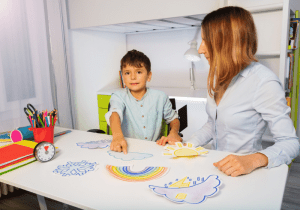When most people think of ABA therapy, they think of teaching children how to behave appropriately in social situations. While this is certainly an important aspect of ABA therapy, there is another critical component that often goes overlooked: teaching emotions. Emotions play a crucial role in our lives, and it is just as important for children with autism to learn how to identify and understand their emotions as it is for them to learn appropriate behaviors. In this post, we will discuss the importance of teaching emotions in ABA therapy, and we will provide some tips on how you can do so effectively.
The Importance In Teaching Emotions During ABA Therapy
 There are a few key reasons why teaching emotions is so important in ABA therapy. First, understanding emotions is essential for social skills development. If a child does not understand how they are feeling, it will be very difficult for them to interact appropriately with others. Second, managing emotions is a crucial life skill. If a child cannot effectively manage their emotions, they will likely struggle in school, at work, and in their personal relationships. Finally, teaching emotions can help to reduce problem behaviors. Often, problem behaviors are the result of a child feeling overwhelmed or frustrated. If a child can learn to identify and cope with their emotions, they will be less likely to act out in negative ways.
There are a few key reasons why teaching emotions is so important in ABA therapy. First, understanding emotions is essential for social skills development. If a child does not understand how they are feeling, it will be very difficult for them to interact appropriately with others. Second, managing emotions is a crucial life skill. If a child cannot effectively manage their emotions, they will likely struggle in school, at work, and in their personal relationships. Finally, teaching emotions can help to reduce problem behaviors. Often, problem behaviors are the result of a child feeling overwhelmed or frustrated. If a child can learn to identify and cope with their emotions, they will be less likely to act out in negative ways.
Tips For Teaching Emotions In ABA Therapy
 There are a few things that you can do to help your child learn about emotions in ABA therapy. Make sure that you are using positive reinforcement. When your child with autism displays appropriate emotional responses, praise them and provide them with rewards. This will help to encourage them to continue using these skills. Use visuals to help your child understand emotions. You can find a variety of emotion charts and other resources online or at your local bookstore. Third, role-play different emotions with your child. This will help them to better understand how different emotions are expressed. Be patient and consistent with your child. Learning about emotions is not something that happens overnight, so it is important to give your child time to master these skills.
There are a few things that you can do to help your child learn about emotions in ABA therapy. Make sure that you are using positive reinforcement. When your child with autism displays appropriate emotional responses, praise them and provide them with rewards. This will help to encourage them to continue using these skills. Use visuals to help your child understand emotions. You can find a variety of emotion charts and other resources online or at your local bookstore. Third, role-play different emotions with your child. This will help them to better understand how different emotions are expressed. Be patient and consistent with your child. Learning about emotions is not something that happens overnight, so it is important to give your child time to master these skills.
If you are looking for more information on ABA therapy, or if you are interested in finding an ABA therapist in your area, please contact us. We would be happy to answer any questions that you may have about applied behavior analysis.


